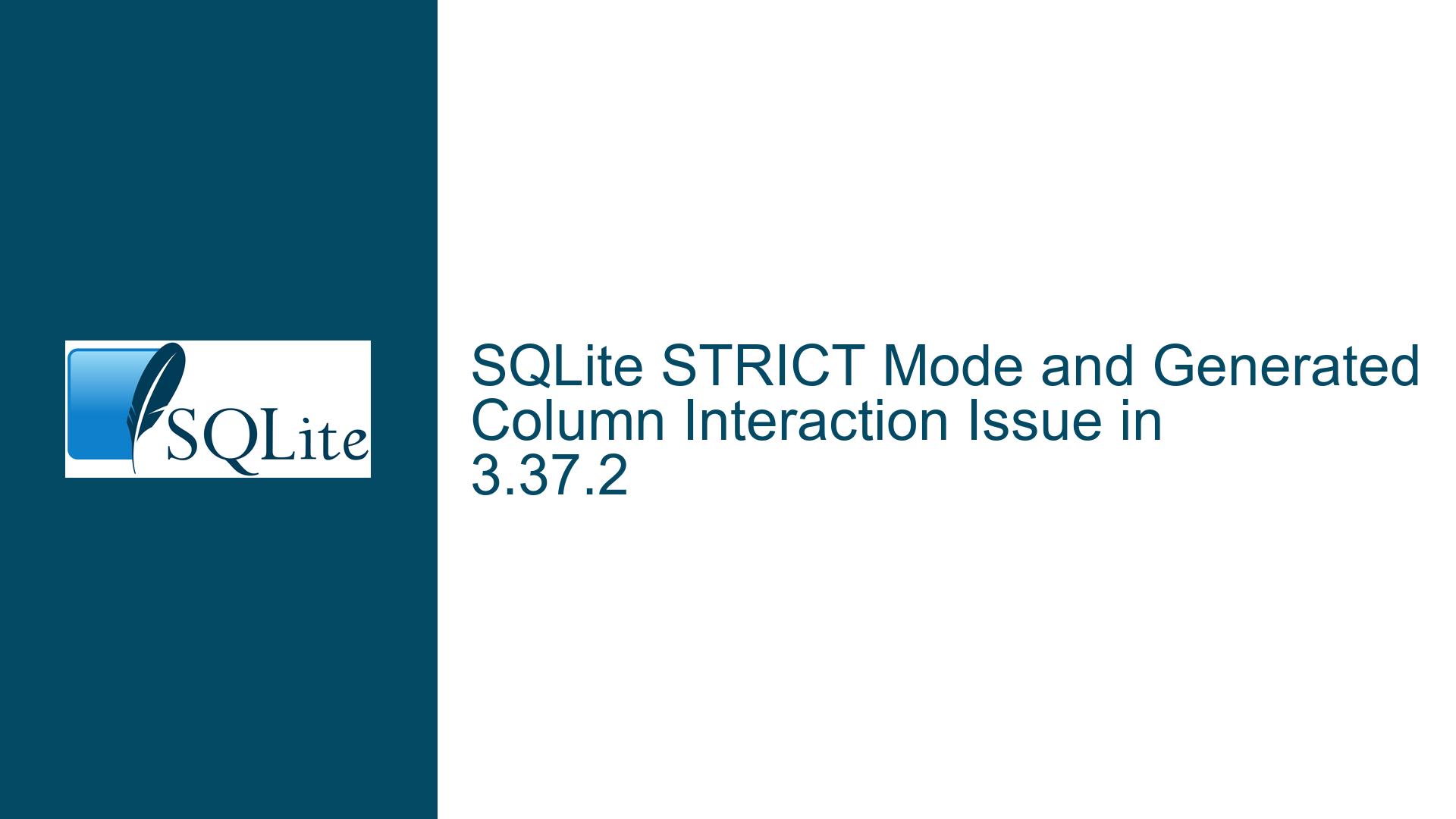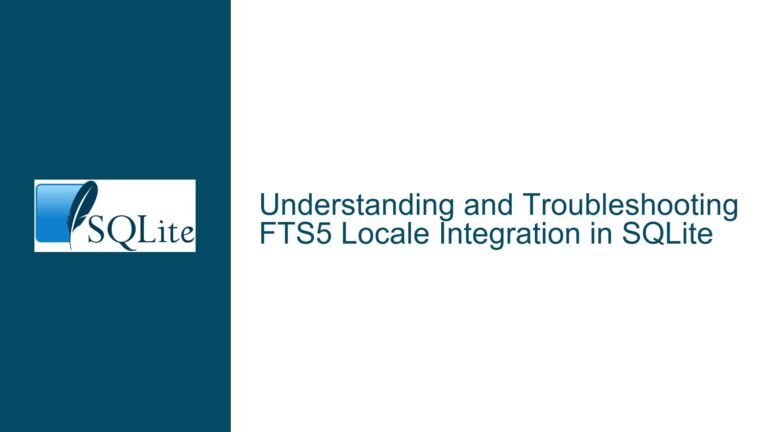SQLite STRICT Mode and Generated Column Interaction Issue in 3.37.2
Issue Overview: STRICT Mode and Generated Columns Causing Type Enforcement Errors
In SQLite version 3.37.2, a specific interaction between the STRICT table mode and generated columns can lead to confusing type enforcement errors. The issue manifests when attempting to insert values into a table with a generated column, where the STRICT mode enforces strict type checking. The error message, "cannot store REAL value in REAL column," is particularly misleading because it suggests a type mismatch where none should exist. This issue is exacerbated when the inserted value is a string representation of a number that could be interpreted as an integer (e.g., "250.00"), but not when the value includes a fractional component (e.g., "250.01").
The problem arises because SQLite’s type affinity system, combined with the STRICT mode, creates a scenario where the type enforcement logic incorrectly flags valid data as invalid. Specifically, the STRICT mode enforces that the data type of the inserted value must exactly match the column’s declared type. However, the generated column’s expression evaluation interferes with this enforcement, leading to the erroneous error. This behavior is unexpected because the generated column’s value is derived from other columns and should not trigger a type enforcement error when the source data is valid.
The issue is reproducible with a minimal test case, as demonstrated in the discussion. For example, creating a table with a REAL column and a generated REAL column, then inserting a value into the table, results in the error. This behavior is inconsistent with SQLite’s usual type handling, where implicit type conversions are typically allowed. The problem is particularly problematic because it affects common use cases, such as importing data from CSV files, where numeric values are often represented as strings.
Possible Causes: Type Affinity, STRICT Mode, and Generated Column Interactions
The root cause of this issue lies in the interplay between SQLite’s type affinity system, the STRICT table mode, and the evaluation of generated columns. SQLite’s type affinity system determines how values are stored and retrieved based on the declared column type. However, the STRICT mode overrides this behavior by enforcing strict type checking, requiring that the data type of the inserted value exactly matches the column’s declared type. This enforcement is intended to prevent unintended type conversions and ensure data integrity, but it interacts poorly with generated columns.
Generated columns are computed based on expressions involving other columns in the table. When a value is inserted into a table with a generated column, SQLite first evaluates the generated column’s expression and then applies the STRICT mode’s type enforcement. In the case of the issue, the generated column’s expression evaluation results in a value that the STRICT mode incorrectly flags as a type mismatch. This occurs because the STRICT mode’s type enforcement logic does not account for the fact that the generated column’s value is derived from other columns and should not be subject to the same type enforcement rules.
The issue is further complicated by SQLite’s handling of numeric values represented as strings. When a string representation of a number is inserted into a REAL column, SQLite typically converts the string to a floating-point number. However, the STRICT mode prevents this conversion, requiring that the inserted value already be of the correct type. This behavior is inconsistent with SQLite’s usual type handling and leads to the confusing error message.
The problem is particularly evident when the inserted value is a string representation of a number that could be interpreted as an integer (e.g., "250.00"). In this case, SQLite’s type affinity system may attempt to convert the string to an integer, which the STRICT mode then flags as a type mismatch. This behavior is unexpected because the string representation of a number should be convertible to a REAL value without issue.
Troubleshooting Steps, Solutions & Fixes: Addressing the STRICT Mode and Generated Column Interaction
To address this issue, several troubleshooting steps and solutions can be employed. The first step is to ensure that the SQLite version being used is up to date. The issue was fixed in a later version of SQLite, so upgrading to a version beyond 3.37.2 may resolve the problem. If upgrading is not an option, there are several workarounds that can be used to avoid the issue.
One workaround is to avoid using the STRICT mode when creating tables with generated columns. The STRICT mode is intended to enforce strict type checking, but it is not always necessary for ensuring data integrity. By omitting the STRICT mode, SQLite’s usual type affinity system will handle type conversions, and the generated column’s expression evaluation will not trigger type enforcement errors. This approach allows for more flexible type handling and avoids the issue altogether.
Another workaround is to explicitly cast the inserted values to the correct type before inserting them into the table. For example, when inserting a string representation of a number into a REAL column, the CAST function can be used to ensure that the value is treated as a REAL value. This approach ensures that the STRICT mode’s type enforcement logic does not incorrectly flag the value as a type mismatch. For example, the following SQL statement explicitly casts the inserted value to a REAL value:
INSERT INTO transactions
SELECT
CAST(nullif(debit, '') AS REAL) AS debit,
CAST(nullif(credit, '') AS REAL) AS credit
FROM csv_import_table;
This approach ensures that the inserted values are of the correct type and avoids the issue with the STRICT mode’s type enforcement.
If the STRICT mode is necessary for ensuring data integrity, another workaround is to use a trigger to enforce type checking instead of relying on the STRICT mode. A trigger can be created to check the type of the inserted values and raise an error if the values are not of the correct type. This approach provides the same level of type enforcement as the STRICT mode but avoids the issue with generated columns. For example, the following SQL statement creates a trigger to enforce type checking for the transactions table:
CREATE TRIGGER enforce_type_check
BEFORE INSERT ON transactions
FOR EACH ROW
BEGIN
SELECT RAISE(ABORT, 'Type mismatch')
WHERE typeof(NEW.debit) != 'real' OR typeof(NEW.credit) != 'real';
END;
This trigger ensures that the inserted values are of the correct type and raises an error if they are not. This approach provides the same level of type enforcement as the STRICT mode but avoids the issue with generated columns.
In conclusion, the interaction between the STRICT mode and generated columns in SQLite version 3.37.2 can lead to confusing type enforcement errors. The issue arises because the STRICT mode’s type enforcement logic does not account for the fact that the generated column’s value is derived from other columns and should not be subject to the same type enforcement rules. To address this issue, several troubleshooting steps and solutions can be employed, including upgrading to a later version of SQLite, avoiding the STRICT mode, explicitly casting inserted values, and using triggers to enforce type checking. By following these steps, the issue can be resolved, and data integrity can be maintained.






